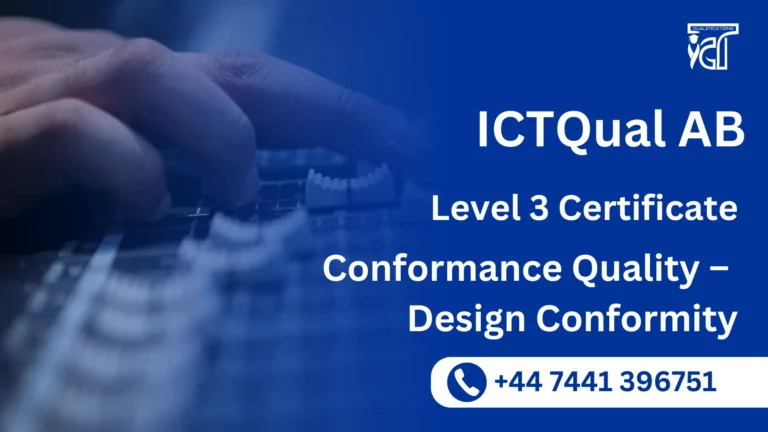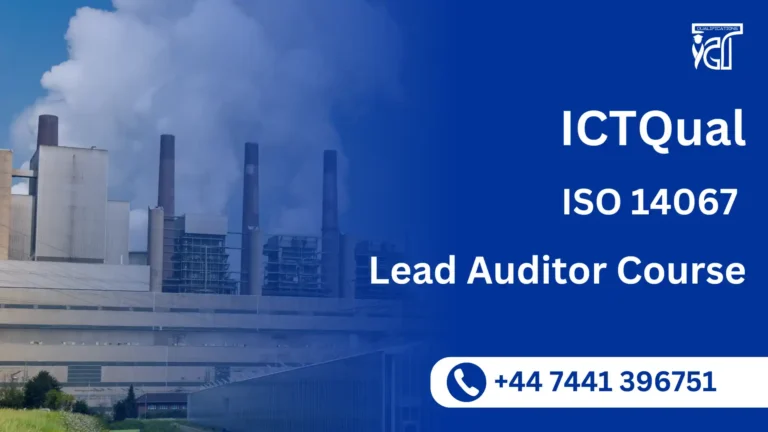The ICTQual AB Level 3 Certificate in Conformance Quality – Process Deviation is designed to provide learners with the knowledge and skills required to identify, analyze, and manage deviations within manufacturing and quality assurance processes. In industries where precision and compliance are critical, even minor deviations can lead to significant risks in safety, performance, and regulatory adherence. This qualification equips participants with a structured approach to understanding process deviations, their root causes, and the corrective and preventive actions necessary to maintain conformance quality.
Learners will explore the principles of deviation management, including documentation, reporting, and corrective action planning. The program emphasizes international standards and best practices, ensuring participants can apply globally recognized frameworks to real-world scenarios. By studying case studies and industry examples, learners will gain practical insights into how deviations occur, how they impact production and compliance, and how organizations can mitigate risks effectively.
The course also integrates modern tools and techniques used in deviation analysis, such as risk assessment models, statistical process control, and continuous improvement methodologies. Learners will develop the ability to evaluate deviations critically, recommend corrective measures, and contribute to organizational success by ensuring processes remain aligned with quality standards.
Ultimately, the ICTQual AB Level 3 Certificate in Conformance Quality – Process Deviation prepares learners to play a vital role in quality assurance teams, compliance departments, and manufacturing operations. By completing this program, participants will gain confidence in managing deviations, supporting regulatory compliance, and driving improvements in process reliability. This qualification serves as a valuable pathway for professionals seeking career advancement in manufacturing, quality assurance, and process management, while reinforcing the importance of precision and accountability in modern industries.
ICTQual AB Level 3 Certificate in Conformance Quality – Process Deviation
This qualification, the ICTQual AB Level 3 Certificate in Conformance Quality – Process Deviation, consists of 3 mandatory units.
| Sr# | Unit Title |
| 1 | Principles of Process Deviation and Quality Standards |
| 2 | Monitoring, Analysis, and Corrective Actions in Processes |
| 3 | Continuous Improvement and Risk Management in Operations |
Learning Outcomes for the ICTQual AB Level 3 Certificate in Conformance Quality – Process Deviation:
Principles of Process Deviation and Quality Standards
- Learners will understand the fundamental principles of process deviation and its impact on operational quality.
- Learners will identify international standards and regulatory requirements for managing deviations.
- Learners will recognise the importance of maintaining process accuracy to reduce defects and ensure compliance.
- Learners will develop knowledge of documentation, traceability, and reporting for quality assurance.
- Learners will evaluate processes to ensure adherence to established quality standards.
- Learners will understand ethical and professional responsibilities in monitoring deviations.
- Learners will analyse the relationship between process deviation control and organisational efficiency.
Monitoring, Analysis, and Corrective Actions in Processes
- Learners will develop skills to monitor operational processes and detect deviations effectively.
- Learners will apply analytical techniques to assess the causes and impact of deviations.
- Learners will gain competence in implementing corrective and preventive actions.
- Learners will maintain accurate records of process deviations and corrective measures.
- Learners will collaborate with teams to ensure effective process control and compliance.
- Learners will enhance problem-solving skills to address deviations and operational inefficiencies.
- Learners will evaluate the effectiveness of monitoring and corrective actions to improve outcomes.
Continuous Improvement and Risk Management in Operations
- Learners will understand continuous improvement methodologies applicable to operational processes.
- Learners will develop the ability to integrate risk management strategies into process optimisation.
- Learners will apply data-driven approaches to enhance efficiency and reduce operational risks.
- Learners will implement feedback loops for ongoing process improvement and deviation reduction.
- Learners will foster a culture of proactive quality management and accountability.
- Learners will assess the impact of improvement initiatives on operational reliability and safety.
- Learners will demonstrate the ability to contribute to long-term organisational excellence through continuous improvement and risk management.
The ICTQual AB Level 3 Certificate in Conformance Quality – Process Deviation equips learners with the knowledge and practical skills to identify, analyze, and manage deviations in manufacturing and quality assurance processes. This qualification strengthens professional competence while supporting organizational compliance and efficiency.
1. Strengthened Technical Knowledge
- Gain a clear understanding of process deviation management and its impact on quality assurance.
- Learn root cause analysis, corrective and preventive action planning, and deviation documentation.
- Acquire skills in applying international conformance standards and regulatory frameworks.
- Develop expertise in risk assessment and statistical process control for deviation analysis.
2. Career Advancement Opportunities
- Enhance employability in industries such as aerospace, automotive, pharmaceuticals, electronics, and consumer goods.
- Position yourself for roles in quality assurance, compliance, or production management.
- Build a foundation for progression into supervisory or specialist positions in deviation management.
- Gain recognition through an internationally respected qualification that demonstrates competence in conformance quality.
3. Contribution to Organizational Success
- Support organizations in identifying and resolving deviations effectively.
- Help reduce risks of non-compliance, product defects, and operational inefficiencies.
- Contribute to improved product reliability, customer satisfaction, and regulatory adherence.
- Strengthen organizational reputation by ensuring processes remain aligned with global quality standards.
4. Personal and Professional Development
- Develop analytical, problem-solving, and decision-making skills relevant to deviation management.
- Build confidence in applying structured approaches to process deviations.
- Strengthen communication and reporting abilities for compliance documentation.
The ICTQual AB Level 3 Certificate in Conformance Quality – Process Deviation is designed for learners who are motivated to understand, analyze, and manage deviations in manufacturing and quality assurance processes. This qualification is suited to individuals who value precision, compliance, and continuous improvement, and who aspire to play a key role in maintaining organizational standards.
1. Technical Interest and Aptitude
- Learners with a keen interest in process control, deviation analysis, and quality assurance frameworks.
- Individuals who enjoy problem-solving, root cause analysis, and applying corrective and preventive actions.
- Those who are detail-oriented and committed to maintaining accuracy and compliance in production environments.
- Candidates eager to understand how deviations affect safety, performance, and regulatory adherence.
2. Career-Focused Motivation
- Professionals aiming to strengthen their role in manufacturing, QA/QC, or compliance teams.
- Technicians, junior inspectors, or production staff seeking career progression in deviation management.
- Learners aspiring to enter industries such as aerospace, automotive, pharmaceuticals, electronics, or consumer goods.
- Candidates who see this qualification as a pathway to supervisory or specialist roles in quality assurance and process management.
3. Contribution to Industry Standards
- Individuals motivated to help organizations identify, document, and resolve deviations effectively.
- Learners who want to reduce risks of non-compliance, product defects, and operational inefficiencies.
- Those committed to supporting continuous improvement initiatives and regulatory compliance.
- Participants who value deviation management as a driver of organizational reliability and customer satisfaction.
4. Personal Growth and Development
- Learners who want to build confidence in applying structured approaches to deviation handling.
- Individuals seeking to strengthen analytical, reporting, and decision-making skills.
- Candidates who embrace accountability and continuous improvement in technical environments.
- Those motivated to grow professionally while contributing to safe, compliant, and efficient manufacturing practices.
The ICTQual AB Level 3 Certificate in Conformance Quality – Process Deviation provides learners with a strong foundation in identifying, analyzing, and managing deviations within manufacturing and quality assurance processes. Completion of this qualification opens pathways to advanced learning and career opportunities in quality management, compliance, and process improvement.
1. Academic and Professional Qualifications
- Progression to higher-level diplomas such as ICTQual AB Level 4 Diploma in QA/QC Piping and Welding Inspector or related technical qualifications.
- Opportunities to pursue specialized certifications in deviation management, root cause analysis, or quality auditing.
- Pathways into international qualifications focusing on lean manufacturing, Six Sigma, and continuous improvement methodologies.
- Eligibility for advanced training in risk management, regulatory compliance, and process optimization.
2. Career Development Opportunities
- Entry into roles such as Quality Assurance Technician, Deviation Analyst, or Compliance Assistant.
- Progression toward supervisory positions in manufacturing, QA/QC, or compliance departments.
- Opportunities to work across industries including aerospace, automotive, pharmaceuticals, electronics, and consumer goods.
- Enhanced employability in organizations that prioritize deviation management and regulatory adherence.
3. Industry-Specific Pathways
- Specialization in industries where deviation management is critical, such as pharmaceuticals, food and beverage, and medical devices.
- Advancement into roles supporting continuous improvement and corrective/preventive action initiatives.
- Opportunities to contribute to research and development projects focused on process reliability and compliance.
- Potential to move into consultancy or auditing roles within quality assurance frameworks.
4. Long-Term Professional Growth
- Building a foundation for leadership roles in quality assurance, compliance, and manufacturing management.
- Developing expertise that supports career progression into advanced technical or managerial positions.
- Establishing a pathway toward lifelong learning in deviation management and conformance quality.
- Strengthening professional credibility through recognized qualifications aligned with global industry standards.
Entry Requirements
Learners must meet the following criteria to be considered for admission into the course:
- Age Requirement: Learners must typically be 16 years of age or older at the time of enrolment
- Educational Background: Completion of secondary school education or equivalent qualification. Basic knowledge of mathematics and science is recommended to support understanding of deviation analysis and compliance frameworks.
- Work Experience: No formal work experience is strictly required; however, prior exposure to manufacturing, QA/QC, or compliance environments is highly beneficial. Candidates with 1–2 years of experience in roles such as production staff, quality assistants, or junior inspectors will find the course particularly valuable.
- English Language Proficiency: Competence in English or the language of instruction is required. Recommended proficiency at CEFR A2–B1 level (or equivalent), ensuring learners can understand technical terminology, participate in discussions, and complete assessments effectively.
Register Now
Qualification Process
Qualification Process for the ICTQual AB Level 3 Certificate in Conformance Quality – Process Deviation
- Self-Assessment:
Begin by evaluating your eligibility to ensure you meet the qualification requirements, including work experience, knowledge, and language proficiency. - Registration:
Complete your registration by submitting the required documents, including a scanned copy of a valid ID, and paying the registration fee. - Induction:
An assessor will conduct an induction to confirm your eligibility for the course and explain the evidence requirements. If you do not meet the criteria, your registration will be cancelled, and the fee will be refunded. - Assignments & Evidence Submission:
Provide all assignments and the necessary evidence based on the assessment criteria outlined in the course. If you are unsure of the required evidence, consult with the assessor for guidance on the type and nature of evidence needed. - Feedback and Revision:
The assessor will review your submitted evidence and provide feedback. Evidence that meets the criteria will be marked as “Criteria Met,” while any gaps will be identified. You will be asked to revise and resubmit if needed. - Competence Evidence:
Submit final evidence demonstrating that all learning outcomes have been met. This evidence will be marked as “Criteria Met” by the assessor once it is satisfactory. - Internal Quality Assurance (IQA):
The Internal Quality Assurance Verifier (IQA) will review your evidence to ensure consistency, quality, and compliance with standards. - External Verification:
The IQA will submit your portfolio to ICTQUAL AB External Quality Assurance Verifiers (EQA) for final confirmation. The EQA may contact you directly to verify the authenticity of your evidence. - Certification:
Upon successful completion of all checks, ICTQUAL AB will issue your official certificate, confirming that you have attained the ICTQual AB Level 3 Certificate in Conformance Quality – Process Deviation.






